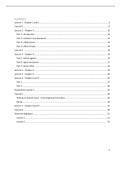Samenvatting
Summary ethics in business management
- Instelling
- Rijksuniversiteit Groningen (RuG)
- Boek
- Business Ethics
This is an extensive and clear summary of all the lectures and chapters of the course ethics in business management, given in the third year of the bachelor bedrijfskunde at the RUG. No additional literature needed when studying, because it is an extensive summary. Good luck studying!! :)
[Meer zien]





